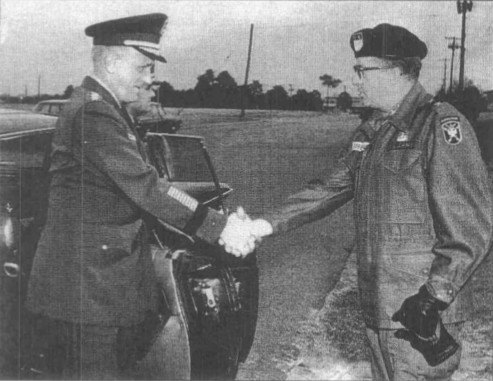
|
Yarborough Special Collection/Boston College

Maj. Gen. William P. Yarborough (right) greets Gen. Harold
Johnson outside the John F. Kennedy Special Warfare School at
Fort Bragg, N.C. Johnson later would be Army chief of staff and
Yarborough his assistant chief of staff for intelligence.
|
|
Army spying on civilians expanded in the ’60s because the FBI and local police forces proved unreliable, according to the man who was the Army’s top spy in 1966-68. But Lt. Gen. William Pelham Yarborough, who became Army assistant chief of staff for intelligence in December 1966, also was motivated by a deeper concern that anarchy and treason lay behind the anti-war and civil rights movements. In a two-hour interview at his North Carolina home, Yarborough defended Army Intelligence’s role in spying on Dr. Martin Luther King Jr. and other Americans and said he never authorized anything illegal. “If it was completely illegal or un-American, we would have turned in our suits,” he said. It had been illegal since 1958 for the Army to spy on American citizens at home, but Yarborough said the FBI, which was responsible for counterintelligence inside the United States, needed help as civil unrest spread. “The FBI was inundated and unable to function,” he said. “Their resources were overloaded and they were especially lacking in black counterintelligence people.” But military records and interviews with former staff members show Yarborough was convinced that Army Intelligence was engaged in a war with Communists for the minds of Americans. “This is a war of ideology and persuasion,” he told Gen. William C. Westmoreland in a February 1968 letter about the protests that had begun sweeping the country. Westmoreland, who commanded U.S. forces in Vietnam from 1965-68, was a West Point classmate, 1936, as was Gen. Creighton Abrams, who commanded U.S. forces in Vietnam after Westmoreland. Yarborough told Westmoreland, “... the minions of Mao Tse-tung and Ho Chi Minh are leading us around by our noses ... even to the degree of having us try to convince ourselves that we can’t win and that Ho’s cause is more just and valid than our own.” Yarborough’s career clearly prepared him for this war. The son of Col. Leroy W. Yarborough, an Army Intelligence officer who served in the Far East from 1918-22, William Yarborough served as an Airborne regimental commander during World War II; deputy director of the Army assistance operations in Cambodia, 1956-57; and commander of the 66th Military Intelligence Group in Stuttgart, Germany, 1958-59, where he worked with legendary spymasters Roger Hilsman and Ed Lansdale. From 1961-65, he commanded the John F. Kennedy Center for Special Warfare at Fort Bragg, N.C. — the Green Berets school. While there, he argued that his elite Special Forces commandoes and Army Intelligence could “mutually support” one another in “counterinsurgency operations both foreign and domestic,” according to letters he wrote to Maj. Gen. Garrison B. Coverdale, commander of the U.S. Army Intelligence Center at Port Holabird, Md. During Yarborough’s tenure as assistant chief of staff for intelligence, Army Intelligence made frequent use of Green Beret troops in domestic spying. An officer who served under Yarborough at Fort Bragg described him as “an expert at counterinsurgency.” One of Yarborough’s top aides at Army Intelligence described him as “a very able guy, much more able than his successor, but he had a rag on about radicals and subversion. He was always saying that we knew how to deal with subversion in other countries but not at home.” Yarborough’s opinion of antiwar protesters comes across clearly in this excerpt from an interview conducted by two Army historians shortly after his retirement in 1975. The general described “the burning of Washington, the siege of the Pentagon” during an October 1967 anti-war march on the Pentagon. “What some people don’t remember was the terror that all this struck into the hearts of the people that thought the empire was coming apart at the seams.” Yarborough said he stood on the Pentagon roof: “It looked like a castle where the Huns had gathered around; as far as the eye could reach, there they were, shaking their bony lists. There were American Nazis. There were Communists. There were hippies.... “I can assure you it was a sight to make you stop to think,” he said. Army Chief of Staff Harold Johnson and Defense Secretary Robert McNamara also were on the roof, Yarborough remembered. “As we looked at this great horde below us, waving their battering rams, so to speak ... the Secretary of Defense turned to the Chief of Staff of the Army and said. ’Johnny, what are we going to do about this?’ “Johnny said, ‘I’m damned if I know.’ ” Yarborough knew: He doubled his intelligence-gathering efforts against King and his supporters. “We had some reason to feel outside influences were aiding and abetting those who had a legitimate right (to protest) inside the U.S., and this became the reason to try and invoke more sophisticated means to find out who was doing what,” Yarborough told The Commercial Appeal. Records show he liked to quote Phillip Abbot Luce’s Road to Revolution: Communist Guerrilla Warfare in the U.S.A. to his staff, particularly the section that said Communists “have obviously decided that urban negro ghettos hold the key to guerrilla activities that can create enough anarchy to constitute a revolution.” “To dig it out,” Yarborough said, “a jettisoning of certain civil rights must take place. One has to resort occasionally to curfews, to search and seizure, to mail monitoring, to telephone tapping, in order to get to that vast (guerrilla) underground.” Yet, Yarborough told The Commercial Appeal, “We were not totalitarians. We were not trying to do our fellow Americans in. We were trying to help the agencies of the government keep law and order so that rational solutions could be reached. “I couldn’t imagine my own country being in an insurgent situation, but the earmarks were there.” |